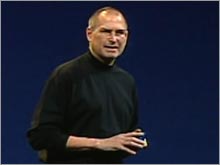|
Do company founders make better CEOs?
Twenty-six FORTUNE 500 firms are still run by the CEOs who built them -- and they're tearing up the market.
(FORTUNE Magazine) - Outside of being in the FORTUNE 500, Costco, Kinder Morgan, and L-3 Communications don't seem to have much in common. Costco (Research) is a warehouse club, Kinder Morgan (Research) an oil- and gas-pipeline operator, and L-3 (Research) a defense contractor. But they share one characteristic that, it turns out, is a surprisingly powerful indicator of corporate success: All three are still run by their founders.
Overall, 26 FORTUNE 500 companies boast founder-CEOs, a subset comprising the likes of Apple Computer (Research), FedEx (Research), and Cardinal Health (Research). (The list does not include Dell, Nike, Microsoft, and Starbucks, whose famous founders are now chairmen.) The stocks of these 26 companies (plus Liberty Media, whose founder John C. Malone stepped down as CEO March 1, but remains chairman) returned an average of 18.5 percent annually from year-end 1995 through 2005, which is seven percentage points better than the FORTUNE 500's average return over the same period. Their profit growth has been superior, too, increasing at an average rate of 19.6 percent a year from 1995 to 2005, vs. 11.7 percent for the FORTUNE 500. Of course, 27 companies is a small sample, and we might have written this off as a statistical fluke had we not come across the research of an Ohio State University finance professor named Rudiger Fahlenbrach. Fahlenbrach analyzed the performance of the 2,300 largest U.S. companies from 1993 through 2002, and he discovered that those run by founder-CEOs (11 percent of the total sample) outperformed the broader stock market by eight percentage points a year. Fahlenbrach has a few theories on why founder-CEOs seem to be better corporate stewards. One is that they simply care more. Their companies are their life's work, so they're more likely to embrace long-term strategies. Supporting the theory is Fahlenbrach's finding that founder-run companies have bigger capital budgets and invest considerably more in research and development than nonfounder-run firms. Fahlenbrach's thesis resonates with founder-CEOs we talked to. "I'm emotionally attached to this company, which means I'm going to do whatever it takes to protect its financial integrity," says Angelo Mozilo, who co-founded mortgage company Countrywide Financial in 1969. "There's no way a babysitter can feel the same way about a child as the parents." Costco founder Jim Sinegal and Kinder Morgan's Richard Kinder echo Mozilo's passion. "It would be truly devastating to me if this company ever failed," says Sinegal. So he doesn't let near-term cost pressures divert him from what he thinks is good business. He pays above-norm salaries to veteran Costco cashiers and resists the urge to hike markups on in-demand luxury goods that keep Costco shoppers coming back. Kinder, who co-founded Kinder Morgan in 1997, has no patience for the costly executive perks that are so common in corporate America. Kinder Morgan doesn't have corporate jets (its executives all fly coach). It doesn't pay for sports tickets (never mind luxury boxes). And there are no special retirement or benefit packages for senior officers (their base salaries are all capped at $200,000). Fahlenbrach's other big theory on the founder premium: They tend to be industry experts, not managerial mercenaries. Sinegal started out in the supermarkets as a bagger, Kinder has 20 years in the energy biz, and L-3's Frank Lanza is an engineer by training who rose through the corporate ranks of Loral and Lockheed Martin before co-founding L-3 in 1997. CEOs with resumes like these "tend to stick with what they know," says Fahlenbrach. That means they're less likely to make the kind of disastrous "diversifying" acquisitions that give M&A a bad name. L-3's Lanza says investment bankers are constantly pitching him proposed acquisitions that would move L-3 beyond the defense sector. "But we don't have the marketing or distribution know-how to do that," he says. "We've made a point to stick to our knitting." With L-3's stock up 110 percent since 2001, Lanza's shareholders are no doubt glad he does.
See all FORTUNE 500 CEOs
Next: See the 2006 FORTUNE 500 FORTUNE 1000 Companies in Your State |
| |||||||||||||||||||||||||||||||||||||||||||||||||||||||||||||||||||||||||||||||||||||||||||||||||||||||||||||||||||||||


